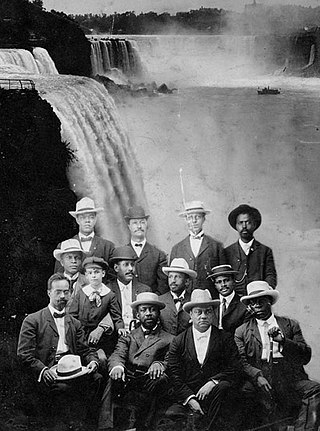Related Research Articles

Carnegie Mellon University (CMU) is a private research university in Pittsburgh, Pennsylvania. The institution was established in 1900 by Andrew Carnegie as the Carnegie Technical Schools. In 1912, it became the Carnegie Institute of Technology and began granting four-year degrees. In 1967, it became Carnegie Mellon University through its merger with the Mellon Institute of Industrial Research, founded in 1913 by Andrew Mellon and Richard B. Mellon and formerly a part of the University of Pittsburgh.

The history of Pittsburgh began with centuries of Native American civilization in the modern Pittsburgh region, known as Jaödeogë’ in the Seneca language. Eventually, European explorers encountered the strategic confluence where the Allegheny and Monongahela Rivers meet to form the Ohio, which leads to the Mississippi River. The area became a battleground when France and Great Britain fought for control in the 1750s. When the British were victorious, the French ceded control of territories east of the Mississippi.

Fisk University is a private historically black liberal arts college in Nashville, Tennessee. It was founded in 1866 and its 40-acre (16 ha) campus is a historic district listed on the National Register of Historic Places.

The Heinz College of Information Systems and Public Policy, also known as Heinz College, is the public policy and information college of Carnegie Mellon University in Pittsburgh, Pennsylvania. It consists of the School of Information Systems and Management and the School of Public Policy and Management. The college is named after CMU's former instructor and the later U.S. Senator John Heinz from Pennsylvania.

The Great Migration, sometimes known as the Great Northward Migration or the Black Migration, was the movement of six million African Americans out of the rural Southern United States to the urban Northeast, Midwest, and West between 1910 and 1970. It was substantially caused by poor economic and social conditions due to prevalent racial segregation and discrimination in the Southern states where Jim Crow laws were upheld. In particular, continued lynchings motivated a portion of the migrants, as African Americans searched for social reprieve. The historic change brought by the migration was amplified because the migrants, for the most part, moved to the then-largest cities in the United States at a time when those cities had a central cultural, social, political, and economic influence over the United States; there, African Americans established culturally influential communities of their own. According to Isabel Wilkerson, despite the loss of leaving their homes in the South, and the barriers faced by the migrants in their new homes, the migration was an act of individual and collective agency, which changed the course of American history, a "declaration of independence" written by their actions.

The Niagara Movement (NM) was a civil rights organization founded in 1905 by a group of activists—many of whom were among the vanguard of African-American lawyers in the United States—led by W. E. B. Du Bois and William Monroe Trotter. The Niagara Movement was organized to oppose racial segregation and disenfranchisement. Its members felt "unmanly" the policy of accommodation and conciliation, without voting rights, promoted by Booker T. Washington. It was named for the "mighty current" of change the group wanted to effect and took Niagara Falls as its symbol. The group did not meet in Niagara Falls, New York, but planned its first conference for nearby Buffalo. The Niagara Movement was the immediate predecessor of the NAACP.
Trotter may refer to:

The Hill District is a grouping of historically African American neighborhoods in the City of Pittsburgh, Pennsylvania. Beginning in the years leading up to World War I, "the Hill" was the cultural center of black life in the city and a major center of jazz. Despite its cultural and economic vibrancy, in the mid-1950s a substantial area was slated for redevelopment, displacing about 8,000 individuals.
The civil rights movement (1896–1954) was a long, primarily nonviolent action to bring full civil rights and equality under the law to all Americans. The era has had a lasting impact on American society – in its tactics, the increased social and legal acceptance of civil rights, and in its exposure of the prevalence and cost of racism.

Karamu House in the Fairfax neighborhood on the east side of Cleveland, Ohio, United States, is the oldest producing Black Theatre in the United States opening in 1915. Many of Langston Hughes's plays were developed and premiered at the theater.
The Marianna Brown Dietrich College of Humanities and Social Sciences is the liberal and professional studies college and the second-largest academic unit by enrollment at Carnegie Mellon University in Pittsburgh, Pennsylvania, USA. The college emphasizes study through rigorous analysis and technology of the behaviors, institutions, and beliefs that constitute the human experience, describing itself as “not an ordinary liberal arts school.” The college was named for Marianna Brown Dietrich, the mother of philanthropist William S. Dietrich II, after his donation of $265 million to the university in 2011 – the largest single donation in Carnegie Mellon history.

The history of African Americans in Chicago or Black Chicagoans dates back to Jean Baptiste Point du Sable's trading activities in the 1780s. Du Sable, the city's founder, was Haitian of African and French descent. Fugitive slaves and freedmen established the city's first black community in the 1840s. By the late 19th century, the first black person had been elected to office.
Earl Lewis is the founding director of the Center for Social Solutions and professor of history at the University of Michigan. He was president of the Andrew W. Mellon Foundation from 2013 to 2018. Before his appointment as the president of the Andrew W. Mellon Foundation, Lewis served for over eight years as Provost and Executive Vice President for Academic Affairs and as the Asa Griggs Candler Professor of History and African American Studies at Emory University. He was the university's first African-American provost and at the time the highest-ranking African-American administrator in the university's history.
The Labor and Working-Class History Association (LAWCHA) is a non-profit association of academics, educators, students, and labor movement and other activists that promotes research into and publication of materials on the history of the labor movement in North and South America. Its current president is James Gregory, professor of history at University of Washington.
Adolph Leonard Reed Jr. is an American professor emeritus of political science at the University of Pennsylvania, specializing in studies of issues of racism and U.S. politics.
Watoga is an unincorporated community in Pocahontas County, West Virginia, United States. Watoga is located on the east bank of the Greenbrier River, 3.5 miles (5.6 km) east-northeast of Hillsboro.
William Wager Cooper was an American operations researcher, known as a father of management science and as "Mr. Linear Programming". He was the founding president of The Institute of Management Sciences, founding editor-in-chief of Auditing: A Journal of Practice and Theory, a founding faculty member of the Graduate School of Industrial Administration at the Carnegie Institute of Technology, founding dean of the School of Urban and Public Affairs at CMU, the former Arthur Lowes Dickinson Professor of Accounting at Harvard University, and the Foster Parker Professor Emeritus of Management, Finance and Accounting at the University of Texas at Austin.

Keeanga-Yamahtta Taylor is an American academic, writer, and activist. She is a professor of African American Studies at Northwestern University. She is the author of From #BlackLivesMatter to Black Liberation (2016). For this book, Taylor received the 2016 Cultural Freedom Award for an Especially Notable Book from the Lannan Foundation. She is a co-publisher of Hammer & Hope, an online magazine that began in 2023.
Tera Hunter is an American scholar of African-American history and gender. She holds the Edwards Professor of American History Endowed Chair at Princeton University. She specializes in the study of gender, race, and labor in the history of the Southern United States.
References
- 1 2 "Joe William Trotter, Jr". WorldCat Entities.
- 1 2 "Joe William Trotter, Jr". Carnegie Mellon University. Retrieved December 16, 2019.
- ↑ "Joe William Trotter, Jr". si.edu. Retrieved December 16, 2019.
- ↑ "Joe William Trotter Jr". Organization of American Historians. Retrieved December 16, 2019.
- ↑ "Joe William Trotter" . Retrieved December 16, 2019.
- ↑ "Joe William Trotter Jr". Ohio School Boards Association. Retrieved December 16, 2019.
- ↑ "Joe William Trotter, Jr". Jacobin Magazine . 4 December 2019. Retrieved December 16, 2019.
- ↑ "Dr. Joe William Trotter , Jr". American Academy of Arts and Sciences. Retrieved December 16, 2019.